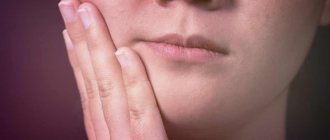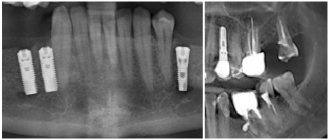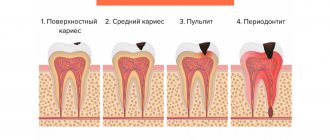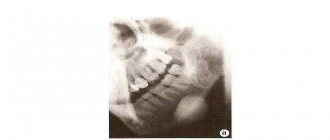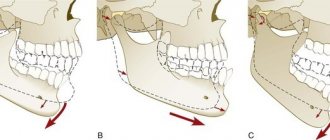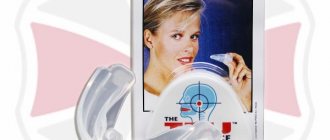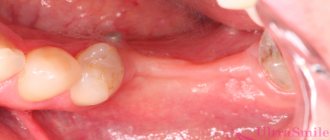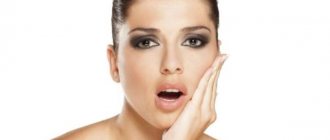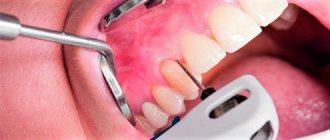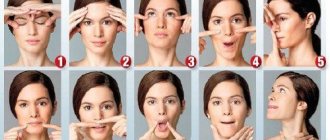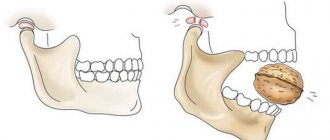There are a lot of things that people don't think about. When expressing emotions, we gesture and actively use facial expressions: we smile with all thirty-two teeth, open our mouth wide in surprise, or, conversely, yawn out of boredom.
Such daily situations may one day be overshadowed by the clicking of the jaw in the cheekbone area. The click can be so strong that the thought flashes in fear: “What is this? Can I close my mouth again?
Causes
If the clicking does not stop, then with a high degree of probability this is a malfunction of the temporomandibular joint (common abbreviation - TMJ).
From a medical point of view, such a click occurs due to the fact that the head has come out of the opening in which it should always be: from the joint capsule . The exit can be horizontal, vertical, diagonal - whatever, the main thing is that it comes out of the normal position, and this can mean a serious problem.
There can be a huge number of reasons. Here is not the most complete list of possible problems:
- any jaw injuries;
- cartilage wear;
- congenital features of the jaw structure, predisposition to sprained ligaments;
- malocclusion (for example, mesial, in which the lower part of the face protrudes slightly or strongly forward), which contributes to tooth wear due to friction;
- inflammatory and neuralgic diseases that provoke tension in the facial nerves, facial muscles and ligaments;
- state of habitual dislocation;
- consequences of dental intervention: incorrect installation of fillings, crowns, implants, dentures, as well as prolonged stay in the dental chair in an uncomfortable position and with an open mouth;
- long-term or short-term, but strong tension of the facial muscles (due to stress, physical activity, chewing solid food);
- tension of the facial muscles during public speaking (singing, reciting poetry, participating in heated discussions, etc.);
- involuntary compression of the jaw muscles, spasms, including at rest, sleep - bruxism;
- advanced forms of caries that have spread to the entire dentition;
- arthritis of the mandibular joint caused by purulent infections.
All these problems directly lead to a violation of the correct load of the jaw, as a result of which the dental planes shift and the joint pops out. Clicking can also occur due to indirect reasons:
- infections of the lower face, ears;
- problems with the spine in the cervical region;
- lack of calcium in the body.
Is it possible to get rid of caries at home in 1 day and if so, how to do it? In this article we will look at all types of stomatitis and we will be able to tell whether it is contagious.
Such problems can make themselves felt at any age. In children, difficulties usually arise due to infections and disproportionate growth, in adolescents - due to the processes of puberty, adults and older people are more susceptible to injuries, inflammation and diseases affecting the oral cavity and cervical region.
While in adolescence the problem may be temporary due to bone growth, in adults the situation can be more serious.
You can try on your own, before visiting a doctor, to exclude or confirm jaw displacement, guided by the following video:
Reasons why your jaw clicks
Clicking sounds in the jaw are a direct indicator of joint injury and indicate that the joint has undergone subluxation or complete dislocation.
This disease mainly occurs when the ligaments that allow joint movement are weakened or stretched. Because of this, they are no longer able to maintain the joint in the correct position, and it jumps out of the socket, which leads to an unpleasant crunching sound near the auricle. Basically, the location of the crunch and pain is one side of the skull.
Doctors have named a large number of reasons leading to jaw crunching, including diseases and external factors.
What kind of sound is produced?
Clicking can vary in nature and volume. Based on the intensity of the sound, the condition is divided into three main types: a light click, which is felt only by the patient himself, a click of medium intensity, or a very strong, pronounced click that is heard by others, sometimes even by a person standing far away.
There is also a classification that divides the problem according to the immediate moment when the click occurs: it can occur during the opening of the mouth or during the process of closing and closing the jaws.
- If a click occurs when you open your mouth, it can happen with a small opening or with an intense opening.
Clicking sounds that occur with a small range of mouth opening, usually quiet, deaf, but very frequent and occur, as a rule, with arthritis, when the meniscus becomes thinner or an inflammatory process develops.This process is usually accompanied by swelling, as well as loosening of the ligaments. Sometimes local fusion of the jaw joint with cartilage occurs. Then, when opening, a sound resembling a crunch occurs.
- If the click occurs when the mouth is half or fully open, then we are most likely talking about serious changes in the articular head.
Most likely, this is a sign of arthritis, and often in an advanced state. During diagnosis, defects in the head, meniscus or cartilage may be detected. The entire joint capsule can participate in this process. - If a click is heard when the mouth closes, a sprain or problem with cartilage tissue may be diagnosed.
There can be two varieties here: when the mouth is open wide and closing has just begun, or when the process of closing the mouth is already at the very end. In the latter case, clicks most likely indicate dislocation due to malocclusion or chronic problems with teeth or their artificial substitutes.
Diagnostics
If the clicking does not stop, you need to do something urgently. The first thing you need to do is consult a doctor, preferably an orthodontist, he will help assess the severity of the situation and first identify the causes.
It can be difficult to immediately unmistakably understand the causes of disturbances in the functioning of the TMJ, especially if patients consult a doctor in advanced cases. Therefore, the orthodontist will most likely give referrals to other specialists - a dentist, a gnathologist, perhaps a surgeon - to conduct a full examination.
The most common diagnostic procedures are carried out in the following order:
- careful questioning of the patient;
- palpation of the painful area;
- studying the characteristics of the bite, the condition of the teeth;
- taking blood tests to identify possible infections and inflammatory processes;
- ultrasonography;
- electromyography of the jaw;
- neurological research;
- X-ray;
- arthroscopy;
- MRI or computed tomography.
The most important thing is to determine whether it is mechanical damage to the TMJ and its components, or a bone disease - arthrosis or chronic arthritis.
If it hurts to open your mouth
Jaw pain can be chronic or acute.
Acute is noted in the following cases:
- jaw injuries;
- arthritis;
- after treatment at the dentist.
If a person has chronic pain that occurs in the morning and goes away after a while, in most cases it is arthrosis.
This problem occurs in people with missing molars. An unpleasant feeling occurs on the side where the teeth are missing. It could also be neuralgia, arthrosis or joint dysfunction.
What to do at home
Sometimes it is not possible to go to see a doctor right away, so you will have to relieve your condition on your own for some time.
If your jaw causes pain when clicking, you should take any painkiller (NEXT, baralgin, analgin, pentalgin, spasmalgon, nurofen, aspirin and other tablets - some of these drugs have an anti-inflammatory effect) and make a warm, damp compress on the problem side, apply it to it a heating pad or a bottle of warm water.
If the inflammatory process has begun, then there is probably already redness and a local increase in temperature, then, on the contrary, you should apply ice in batches of 15 minutes with breaks of half an hour to an hour.
Infusions of medicinal herbs (calendula, St. John's wort, lingonberry, nettle, chamomile, pine buds) can provide some assistance in reducing pain and have an anti-inflammatory effect. You should rinse your mouth with these decoctions, focusing on the half of the jaw that hurts.
Massaging the muscles in the neck and head will also help.
After the massage, use available muscle relaxation techniques. You should limit your consumption of solid foods: apples, nuts, crackers. To prevent a relapse, you should refrain from opening your mouth wide, as well as yawning, coughing and laughing carefully.
However, if the ability to laugh has been preserved, then the clicking does not cause much concern, which means that some methods can help eliminate the problem. In any case, it's worth trying them.
Quite effective and also a preventive measure is special gymnastics. The main list of exercises is as follows:
- Smooth opening of the mouth - you should start with small openings, gradually increasing the distance between the teeth to the limiting moment, without allowing a click - repeat 15 to 20 times, more if the condition allows;
- Slowly moving the lower teeth forward with the mouth closed, also up to 20 times, and the same amount with the mouth half open;
- Gentle movements of the lower jaw in a circular or left-right direction – at least 10-15 times;
- Gradual compression of teeth to the limit followed by relaxation - up to 10 times;
- Horizontal pressure with your hand on the base of the chin, while letting the lower jaw provide all possible resistance - 10-15 times.
Exercises must be repeated the specified number of times, 3-5 approaches per day . Before gymnastics, the lower part of the face should be warmed up by applying a warm compress to soften the muscles and ligaments and improve blood circulation.
If gymnastics causes pain, it means that the situation is still serious, and you cannot do without a visit to the doctors.
Mechanism and causes of crunching
Jaw clicking occurs in people of all ages. Sometimes a yawn is enough for the articular head to move. Children are most often affected by the disease.
The jaw clicks when the TMJ is dislocated/subluxated. Under normal conditions, all movements of the joint head must occur within the joint capsule. A click when opening the mouth indicates a shift in the position of the articular head and occurs at the moment when it returns to its place.
There are several reasons why your jaw starts to click:
- abnormal bite;
- spasm of the facial muscles (occurs against the background of stress, physical activity);
- doctor’s mistake: poor-quality prosthetics or filling leads to incorrect distribution of the chewing load;
- trauma in the lower jaw;
- arthritis (often develops after purulent tonsillitis, otitis media, tuberculosis);
- grinding teeth during sleep (bruxism);
- jaw dislocation;
- professional activity (the problem arises among singers, presenters, and reciters);
- large carious lesions in the mouth.
There are no nerve endings in the joints. Therefore, problems in such locations do not cause pain. With significant lesions in the mouth, inflammation spreads to neighboring areas. If the clicking of the lower jaw when opening the mouth is accompanied by pain, then the process has started. The most common cause of pain in such situations is a headache.
With TMJ, pain appears in the temporal and occipital regions. The symptoms of the disease can easily be confused with migraine. Therefore, it is important to consult a doctor in time and undergo a full course of examination to find out what caused such clicking. It's good to visit several specialists. This will help establish the correct diagnosis as accurately and quickly as possible.
Classical treatment methods
Treatment of mandibular joint dysfunction is carried out by dental specialists. To fully understand what is happening, you should consult several doctors, and any doctor in such a situation will refer the patient to specialists in related fields.
Treatment methods will depend on the immediate cause of the problem:
- If teeth are missing, they will need to be restored; if they need treatment, the entire necessary complex must be carried out;
- If a malocclusion is diagnosed, it will have to be corrected, as the problem may return after some time;
- If inflammation is detected, physiotherapy (electrophoresis, ultrasound, galvanization) and antibiotics (only as prescribed by a doctor) are prescribed; if acupuncture is available, that is also prescribed;
- If the clicking is caused by muscle spasms, wearing a special orthopedic splint will help; it will limit jaw movement;
For more serious symptoms, surgery will be performed:
- Minimally invasive.
The name of this technique speaks for itself - surgical intervention is performed with minimal penetration. This method is used when the problem is slightly advanced, and is performed under local anesthesia. Using several thin needles, a medicine is injected into the problem area, washing away damaged cells and pus. The cartilage surface is cleansed and the production of physiological fluids is normalized. The joint gradually returns to its proper place. - Arthroscopy carried out in cases where the invasive method is insufficient or was carried out but did not give the expected results.
The arthroscopy technique uses a probe, a miniature scalpel and, in some cases, scissors, with which damaged tissue is removed, as well as adhesions and scars that have already appeared.The cartilage becomes smoother, and normal jaw mobility returns as the human body helps the joint gradually recover.
- Open surgery. Open surgical intervention will be insisted upon if the injury and damage to the mandibular joint is very serious, aggravated by tumor processes and cell death.
Through a surgical incision, which is made near the auricle (front or back), the affected areas are removed and, if necessary, the elements of the joint are replaced. - During open surgery, prosthetics can also be performed. If the head is so damaged that all that remains is to remove it, you will have to replace it with an artificial one.
In addition to the introduction of the prosthesis, partial use of nearby muscles and elements of preserved cartilage is carried out to ensure the isolation of the bone endings from the foreign body for the normal functioning of the joint. - Use of retroauricular technique. To restore normal function of the jaw, fixing screws are implanted into it.
This method is used in cases where the patient’s body does not show allergic reactions to the materials from which such screws are made. After such an operation, the patient feels his jaw as completely healthy.
After treatment, a gentle regime is necessary for the work of the lower facial regions: chewing gum, rough food, excessive physical activity are contraindicated, and for some time it is recommended to use a protective spacer between the teeth during sleep.
We will tell you in detail how to prevent mucositis during chemoradiotherapy. And here it is described how to treat a fistula on the gum with folk remedies.
By following the link: https://dentist-pro.ru/lechenie/yazyk-l/zelenyj-nalet-prichiny.html - you can find out what problems in the body are indicated by a green coating on the tongue.
If pain occurs
If a dull pain occurs when you click your jaw, this most likely indicates mechanical problems with the joint. If the pain is acute or increasing, which is accompanied by swelling, then the problems are more serious - we are talking about inflammation, intra-articular or even bone changes.
It is much worse if the pain does not have an exact localization: when there is a sensation of ringing in the ears, painful sensations radiating to the ear or teeth, or spreading to the temple, neck, back of the head and even to the scapular part of the back - all this can complicate an accurate diagnosis.
Especially often, with TMJ diseases, headaches occur, usually in the temporal or occipital part. The pain can be so severe that even an experienced doctor may suspect migraine and other problems associated with the blood vessels of the brain.
Failure to see a doctor in a timely manner can not only result in a protracted search for the true cause of the pain, but also aggravate the situation, leading to the following consequences:
- neuralgia of the facial muscles;
- joint dislocation, the occurrence of chronic defects;
- disc tear or damage;
- arthrosis of the lower jaw;
- gradual destruction of the joint, up to complete.
If the disease is neglected, the treatment will be delayed and will be not only more expensive, but also less effective, with inevitable side effects.
Arthritis of the mandibular joints
If you feel severe pain when clicking, this may be a clear symptom of arthritis. Arthritis is an internal infection of the joint followed by acute inflammation. Infection can occur in a variety of ways, including through injury, and can destroy tissue.
Destruction can transform arthritis into a chronic form and even lead to ankylosis - a complete disruption of the motor function of the lower jaw.
As mentioned above, if clicks occur when you open your mouth and are more like a crunch, this is precisely a sign of the likelihood of incipient arthritis.
The pain that occurs during the opening process naturally intensifies as you chew food and apply pressure to the area. In addition, the painful area becomes red and swollen because inflammation has already begun.
There is also a sensation of the jaw shifting to the side. All this is often accompanied by dizziness, fever and lethargy. If the inflammatory process is aggravated by suppuration, hearing deterioration and even partial loss may occur.
When things have gone this far, surgical intervention is indispensable. After the operation, the patient must wear a specially made sling-shaped bandage for some time and keep the plate between the teeth.
In addition to a strict diet of liquid dishes, antibiotic therapy and regular physiotherapy are prescribed. Therapeutic exercises and massage are started after the bandage is removed.
The jaw clicks when opening the mouth and chewing, it hurts and crunches - which doctor should I consult?
Today, many people face this problem when their jaw crunches when opening their mouth. Moreover, such a problem can accompany a person from birth.
It usually appears when there is heavy load on the jaw. In the absence of other symptoms, this phenomenon is not considered dangerous.
However, if the crunching brings significant discomfort, it is better to contact a qualified specialist.
This aspect deserves special attention. The cause of the crunch may lie in the characteristics of the muscle tissue. It can be characterized by high elasticity and density. Some muscles stretch quickly and are very elastic. If the fibers are pliable, then their ability to fix the joint will be significantly lower.
As a result, there is a decrease in the tone of the ligamentous apparatus. The weakening can gradually cause the lower jaw to become loose at the joint. Outwardly, this practically does not manifest itself, since the distortions are insignificant. Over time, symptoms such as chewing crunches and facial asymmetry may worsen.
Jaw crunching when chewing and opening the mouth
A crunch in the jaw area is caused by a joint being misaligned or incorrectly positioned. This trouble may be accompanied by dizziness, discomfort and pain in the temples, teeth grinding and increased sensitivity of the surface of the teeth.
If your jaw crunches when you chew food, this may indicate thinning of the disc in the cartilage and the development of arthritis. This can also be caused by muscle spasm, injury or surgical procedures.
In any case, this problem cannot be ignored. A crunch in the jaw left unattended can result in it jamming if you open your mouth wide.
Jaw crunching in childhood
So what do you need to know about this? Young children and teenagers often experience jaw clicking when chewing. The reasons for this phenomenon are due to the fact that the required amount of synovial fluid is not always formed in the joints. As a result, a crunch appears, not only in the jaw joints, but also in the knees.
Painful sensations
Eliminating such a disease is not difficult if measures are taken in time. But if the crunch is accompanied by pain, then this may indicate incipient arthrosis. Everyone knows that such a diagnosis requires immediate treatment to avoid serious consequences.
- Increasing pain in the jaw area, especially in the joint area.
- Pain while standing still.
- Unpleasant sensations on palpation.
- Noise and discomfort in the ears.
We invite you to familiarize yourself with: Clasp removable denture for the lower jaw
Ignoring these symptoms can lead to increased tone of the facial muscles, and this, in turn, will lead to a change in the oval of the face and its deformation.
Reasons related to professional activities
Sometimes the jaws begin to crunch when chewing in representatives of some professions. This is especially true for those who, due to the nature of their work, have to talk and sing a lot.
Crunching and clicking noises can develop over many years and gradually become permanent. This condition is not always accompanied by serious pathologies.
After completing professional activities, the deviation usually returns to normal. This is due to a decrease in the load on the jaw joints.
In what areas can crunching occur?
The left side of the jaw crunches. If a crunching sound is heard on the left side of the jaw when opening the mouth, this may indicate a malfunction of the left temporal joint. In addition to unpleasant pain, the patient may experience noise and discomfort in the ears.
The right side of the jaw crunches. Characteristic clicks on the right side may indicate the onset of inflammation. Swelling and redness may appear at the site of inflammation. The crunch is accompanied by pain both when opening the mouth and at rest.
It is not easy to identify dysfunction of this joint, since its main symptoms are frequent pain in the temples and strained neck muscles.
Rheumatoid arthritis
Why does my jaw crunch when chewing? Perhaps the reason lies in a disease such as rheumatoid arthritis. It can affect various bone elements of the body, including the mandibular joint. The cartilage tissue gradually begins to become inflamed and can no longer perform a connective function.
Wrong food intake
Dislocation of the jaw joints can be caused by inaccurate mechanical actions during chewing. Injury to the jaw can occur when yawning forcefully or chewing hard food. The crunch occurs immediately and is accompanied by acute pain. It is almost impossible to put the jaw back in place on your own with such damage.
More serious pathologies
Pathologies caused by disturbances in the functioning of the TMJ require an integrated approach. The desired therapeutic effect can be achieved through a combination of dental treatment, medications and physical therapy.
It is not uncommon for several doctors to treat one patient. Before starting therapy, they determine the reason why your jaw is cracking. Since there are many provoking factors, the approach to treatment in each individual case will be different.
If it's arthritis
With arthritis, the jaw joint hurts and creaks. Infection is the main reason why the disease develops. Pathogenic microorganisms penetrate deep into the joint, where they begin to actively multiply. Over time, the inflammatory process leads to the destruction of joint tissue.
Sometimes arthritis develops after an injury; this is associated with blood entering the joint. The main thing that needs to be done when the head has moved beyond the glenoid cavity is to ensure maximum rest for the joint.
The patient will wear a sling bandage for the first few days. During this period, he must follow a special diet, including exclusively liquid meals.
Anti-inflammatory drugs and antibiotics help eliminate inflammation and fight infection. In severe cases, glucocorticosteroids (Hydrocortisone, Prednisolone) are used. The patient is also referred for physiotherapy. Therapeutic gymnastics and massage will help you recover faster.
Doctors increasingly began to use botulinum. The modern method allows you to relieve symptoms and prevent the development of degenerative changes in the joint by injecting botulinum toxin directly into the site of inflammation.
Arthritis often leads to the development of complications. If the inflammation progresses to the stage of suppuration, the help of surgeons is required. The doctor performs the operation in a hospital setting, then the patient is prescribed a course of antibiotic therapy.
For arthrosis
Arthrosis of the jaw joint is a chronic disease of the skull bones, in which degenerative and atrophic changes in cartilage tissue occur. The disease leads to limited mobility of the affected joint.
Self-medication can aggravate the situation, so you should not do this. Treatment should be carried out under the supervision of a physician. The following will help alleviate the patient’s condition, relieve inflammation and pain:
- Anti-inflammatory drugs (Diclofenac, Ibuprofen, Ketorol, etc.). For gastrointestinal diseases, Omeprazole or Lansoprazole is additionally prescribed. These medications are designed to reduce stomach acidity.
- Vitamins (Ascorbic acid, Cholecalciferol, etc.).
- Hyaluronic acid (promotes the restoration of cartilage tissue).
- Anesthetic intra-articular injections (Disprospan is injected once every six months).
- Hormonal drugs (prescribed to women during menopause).
When the functions of the TMJ are impaired, patients often experience headaches. With these symptoms, they usually turn to a therapist or neurologist. Specialists carry out treatment unsuccessfully, and the patient continues to experience pain. You can get rid of noise when chewing only if joint pathology is identified.
An orthodontist, gnathologist or dentist, having found out the cause of the disease, prescribes appropriate treatment. At the initial stage, anti-inflammatory drugs will help get rid of pain and inflammation.
In other cases, it is necessary to install a fixing splint that limits the movement of the joint. With the help of a mouthguard, the jaw gradually returns to the desired position.
Surgery is recommended for patients with severe TMJ pathologies.
Malocclusion
Sometimes crunching and clicking sounds when opening the mouth appear as a result of previous dental treatment.
After tooth extraction, due to errors in prosthetics or poor-quality filling, the bite is disturbed. In this case, you can quickly fix the problem.
To restore the dentition, it is necessary to change the prosthesis, build up too worn teeth, or install a prosthesis to replace a lost tooth.
We suggest you read: The jaw clicks and hurts on one side
If bite defects were caused by other reasons, then treatment measures will be aimed at restoring the dentition by installing braces or other orthodontic structures. The teeth will gradually take the desired position. Treatment may take several years.
What to do if your jaw cracks? Pay attention to accompanying signs. The following symptoms should be a cause for real concern:
- pain when opening the mouth, clenching teeth and chewing;
- discomfort when pressing on the right or left side;
- ringing or noise in the ears;
- pain radiates to the lower part of the face and ear area;
- swelling and redness;
- Painful sensations appear even during a conversation.
Crunching in a joint can be associated with serious pathology. But diagnosing this condition is usually very difficult. To accurately determine the causes, you should undergo a full examination of the body, take tests, and do a CT scan of the jaw.
Recommendations
In many cases, the unpleasant phenomena associated with jaw crunching can be avoided. To do this, just follow the following recommendations.
- At the first symptoms, you should consult a therapist. Based on your complaints, the doctor will give you a referral to specialists.
- Painkillers can be used to reduce pain.
- If pronounced swelling occurs, warm compresses should never be applied. They can only intensify the inflammatory process.
- Solid foods, as well as foods that require chewing effort, should be excluded from your diet for a while. This will help reduce stress on the jaw joints.
Conclusion
In this review, we took a closer look at why the jaw crunches when chewing. The reasons for this phenomenon can be different: from a lack of nutrients and microelements to serious damage to bone tissue. Therefore, it is extremely important to contact a qualified specialist with this problem. He will conduct a detailed diagnosis and prescribe appropriate treatment.
Sometimes the cause of crunching is associated with eating hard and difficult to chew food. “I’ve been chewing gum for a long time, now my jaw hurts” - such complaints can often be heard from patients. In this case, it is enough to give up such products for a while, and the normal functioning of the joint will be restored.
Source: https://denta-da.ru/khrust-chelyusti-otkryvanii-prichiny/
Prevention
To prevent problems with TMJ, you should first pay due attention to dental procedures and any non-trivial conditions associated with the jaw:
- Visit a doctor in cases of injury;
- Promptly treat teeth and gums;
- Pay attention to respiratory tract infections;
- When chewing food, you need to use the right and left sides of the dentition equally;
- It is recommended to sleep on a low pillow, which allows the cervical spine not to bend and the muscles not to strain;
- Regular physical exercise, especially exercises for the cervical spine.
